The Intelligent Upgrading of Logistics between an Internet Enterprise and a Logistics Enterprise Based on Differential Game Theory
Abstract
1. Introduction
2. Literature Reviews
2.1. Research on the Intelligent Upgrading of Logistics
2.2. Research on the Collaborative Mechanisms of Logistics Enterprises
2.3. Research Gap and Contribution
3. Problem Description and Model Assumption
4. Model Construction and Solution
4.1. The Game Theory Model under the Non-Cooperative Mechanism
4.2. The Game Theory Model under the Cooperative Mechanism
4.3. The Game Theory Model under the Cost-Sharing Mechanism
4.4. Comparison of Model Results under the Three Different Mechanisms
5. Numerical Simulation and Sensitivity Analysis
5.1. Numerical Simulation under Three Mechanisms
5.2. The Effect of Key Parameters on the Numerical Simulation
6. Managerial Implications
- (1)
- Participating enterprises should formulate a multi-dimensional revenue distribution mechanism and cost-sharing mechanism on the basis of their own technological contribution, financial support, and risk-taking level, and strengthen their long-term trust relationship by entering into project cooperation agreements, engaging in joint investments, and engaging in cross ownership, which can ensure the unity of purpose between participating enterprises in intelligent logistics development.
- (2)
- On the one hand, Internet enterprises should create innovative capacity to develop software and devices for intelligent logistics and, through technological exchanges and the “opened and shared laboratory” project, should provide R&D resources to logistics enterprises with lower technological endowments to improve the synchronization of intelligent development. On the other hand, logistics enterprises should pay more attention to the advanced science of the logistics industry, proactively expanding the application of emerging technologies, such as Smart WMS and Smart TMS. Compared with the traditional logistics management system, the smart logistics system utilizes machine learning and artificial intelligence algorithms, enabling it to perform inventory forecasting and intelligent path planning. These functional modules allow for a more accurate and efficient process planning of warehouse operations.
- (3)
- Logistics enterprises should establish an effective information-sharing mechanism with Internet enterprises and align the intelligent technology and equipment from internet enterprises with suitable application scenarios. In addition, participating enterprises should cultivate research-oriented and application-oriented talents in intelligent logistics. They can support conducive resources for logistics professionals to focus on their research by leveraging the resources of universities and research institutes. Meanwhile, they should attach much importance to conducting training programs involving comprehensive intelligent logistics skills for employees and developing engaging teaching cases based on regular operational experiences in intelligent logistics. These practices enhance the compatibility of intelligent technologies within logistics enterprises.
- (4)
- Participating enterprises should collaborate to develop business modules that encompass precise distribution, quick response, and online feedback mechanisms, thereby enhancing the marketing competitive advantages of intelligent logistics. This not only meets the experiential consumption needs of customers but also enhances service value.
- (5)
- An evaluation system for the intelligentization of logistics should be established to monitor and accurately assess the intelligent level of logistics and revenue in real time, identifying key elements for the intelligent upgrading of logistics. This evaluation system will provide valuable insights for subsequent practices aimed at the intelligent upgrading of logistics.
7. Conclusions and Research Limitations
- (1)
- The cost-sharing mechanism and the cooperative mechanism can motivate participating enterprises to improve their own efforts for the intelligent upgrading of logistics and eventually increase the revenue of collaboration. Under the cooperative mechanism, the efforts made by the Internet enterprise and the logistics enterprise and the advertising and marketing cost of the logistics enterprise are the highest, with the result that the level of intelligent upgrading of logistics and the goodwill of intelligent logistics both reach the highest level. Under the cost-sharing mechanism, the higher revenue distribution ratio can persuade the Internet enterprise to provide more cost allowance to the logistics enterprise.
- (2)
- Participating enterprises can increase the revenue by creating and improving internal and external conditions conducive to the intelligent upgrading of logistics. This includes enhancing the enterprise’s capacity for intelligent innovation and cost management efficiency, as well as cultivating customer preference for intelligent logistics services.
- (3)
- Under the non-cooperative mechanism, a lower revenue distribution ratio diminishes the willingness of logistics enterprises to make an effort in the intelligent upgrading of logistics, which is not conducive to the improvement of total revenue. Conversely, when internet enterprises extend a cost allowance to the logistics enterprises in accordance with the revenue distribution, it can effectively alleviate the revenue competition between them. At that time, as the revenue sharing ratio increases, the more effort logistics enterprises put into the intelligent upgrading of logistics, which still increases total revenue. Under the cost-sharing mechanism and the non-cooperative mechanism, a diminished revenue sharing ratio can discourage the logistics enterprise from investing more advertising and marketing costs on intelligent logistics, which ultimately weakens the goodwill of intelligent logistics and undermines the total revenue.
Author Contributions
Funding
Institutional Review Board Statement
Informed Consent Statement
Data Availability Statement
Conflicts of Interest
References
- Chen, H.; Zhang, Y. Regional Logistics Industry High-Quality Development Level Measurement, Dynamic Evolution, and Its Impact Path on Industrial Structure Optimization: Finding from China. Sustainability 2022, 14, 14038. [Google Scholar] [CrossRef]
- Zhang, Y.; Kong, J.; Zhang, Y.; Wang, H.; Deng, S. Case Study of Stratification, Spatial Agglomeration, and Unequal Logistics Industry Development on Western Cities in China. J. Urban Plan. Dev. 2022, 148, 05022009. [Google Scholar] [CrossRef]
- Gupta, H.; Shreshth, K.; Kharub, M.; Kumar, A. Strategies to Overcome Challenges to Smart Sustainable Logistics: A Bayesian-Based Group Decision-Making Approach. Environ. Dev. Sustain. 2023, 26, 11743–11770. [Google Scholar] [CrossRef]
- Dong, F. Development of Smart Logistics under the New Development Pattern: New Characteristics, Key Problems and Countermeasure Suggestion. Econ. Rev. J. 2021, 37, 77–84. [Google Scholar] [CrossRef]
- Qian, H.; He, J.; Guang, J. Research on the Coupling Effect Evaluation of “Intelligent + Sharing” Logistics. China Bus. Mark. 2019, 33, 3–16. [Google Scholar] [CrossRef]
- He, L. The Development Trend of China’s Smart Logistics. China Bus. Mark. 2017, 31, 3–7. [Google Scholar] [CrossRef]
- Zhongshang Industrial Research Institute. Market Prospect and Investment Research Report of China’s Smart Logistics Industry in 2023. Available online: https://www.askci.com/news/chanye/20230223/164757267714207745350738.shtml (accessed on 6 July 2024).
- Qian, Y. The Challenges and Solutions for Building a Smart Logistics Platform Ecosystem. Environ. Eng. 2023, 41, 269. [Google Scholar]
- Huang, X. How to Promote Data Sharing among Enterprises Based on Dynamic Evolutionary Game Analysis. Technol. Anal. Strateg. 2024, 36, 1–20. [Google Scholar] [CrossRef]
- Tan, X.; Zhang, B.; Wang, T. Research on Collaborative Governance of Multi-Subject Logistics Standardization Behavior under the Background of Circulation Integration. J. Syst. Sci. Math. Scis. 2024, 43, 1–20. [Google Scholar]
- Zhang, J.; Tao, J.; You, M. An Empirical Study on the Co-Development of Manufacturing Enterprises and Logistics Enterprises Enabled by the Big Data. China Bus. Mark. 2020, 34, 3–14. [Google Scholar] [CrossRef]
- Geromel, R. As Tech Cold War Looms, Chinese Internet Giants Like Alibaba and Tencent Tackle Emerging Markets. Available online: https://www.forbes.com/sites/ricardogeromel/2019/06/17/as-tech-cold-war-looms-chinese-internet-giants-like-alibaba-and-tencent-tackle-emerging-markets/#319afc95ee09 (accessed on 5 August 2024).
- Vecchi, A.; Brennan, L. Two Tales of Internationalization—Chinese Internet Firms’ Expansion into the European Market. J. Bus. Res. 2022, 152, 106–127. [Google Scholar] [CrossRef]
- International Business Machines Corporation. Intelligent Future Supply Chain. Available online: https://www.ibm.com/downloads/cas/PNA4QGQM (accessed on 24 May 2024).
- Nowicka, K. Smart City Logistics on Cloud Computing Model. In Proceedings of the 1st International Conference Green City 2014-Green Logistics for Greener Cities, Szczecin, Poland, 19–21 May 2014; pp. 266–281. [Google Scholar]
- Calatayud, A.; Mangan, J.; Christopher, M. The Self-Thinking Supply Chain. Supply Chain. Manag. 2019, 24, 22–38. [Google Scholar] [CrossRef]
- Wang, B.; Wang, Y. AHI: Smart Logistics for Autonomous Transport Using IoT and Blockchain Technology. Int. J. Coop. Inf. Syst. 2023, 32, 2150006. [Google Scholar] [CrossRef]
- Feng, B.; Ye, Q. Operations Management of Smart Logistics: A Literature Review and Future Research. Front. Eng. Manag. 2021, 8, 344–355. [Google Scholar] [CrossRef]
- Barenji, A.V.; Wang, W.M.; Li, Z.; Guerra-Zubiaga, D.A. Intelligent E-Commerce Logistics Platform Using Hybrid Agent Based Approach. Transport. Res. Part E-Logist. Transp. Rev. 2019, 126, 15–31. [Google Scholar] [CrossRef]
- Wang, T.; Chen, H.; Dai, R.; Zhu, D. Intelligent Logistics System Design and Supply Chain Management under Edge Computing and Internet of Things. Comput. Int. Neurosci. 2022, 2022, 1823762. [Google Scholar] [CrossRef] [PubMed]
- Roman, G. Intelligent Logistics Systems in E-Commerce and Transportation. Math. Biosci. Eng. 2023, 20, 2348–2363. [Google Scholar]
- Sun, L.; Zhang, S. Driving Factors of Smart Upgrading and Its Effect on Logistics Enterprises’ Performance. China Bus. Mark. 2020, 34, 15–26. [Google Scholar] [CrossRef]
- Shee, H.K.; Miah, S.J.; Vass, T.D. Impact of Smart Logistics on Smart City Sustainable Performance: An Empirical Investigation. Int. J. Logist. Manag. 2021, 32, 821–845. [Google Scholar] [CrossRef]
- Liu, W.; Long, S.; Wei, S.; Xie, D.; Wang, J.; Liu, X. Smart Logistics Ecological Cooperation with Data Sharing and Platform Empowerment: An Examination with Evolutionary Game Model. Int. J. Prod. Res. 2022, 60, 4295–4315. [Google Scholar] [CrossRef]
- Gu, C.; Zhang, S. Network Structure and Influencing Factors of Spatial Connection in the Intelligence of China’s Logistics Industry. Econ. Geogr. 2023, 43, 117–127. [Google Scholar] [CrossRef]
- Fan, S. Influencing Factors and Countermeasures on Intelligent Transformation and Upgrading of Logistics Firms: A Case Study in China. PLoS ONE 2024, 19, e0297663. [Google Scholar] [CrossRef] [PubMed]
- Zhang, X.; Wang, H.; Gao, C.; Li, J. Synergistic Strategy Patterns of Environmental Protection Enterprises: An Exploratory Study Based on Grounded Theory. J. Manag. Case Stud. 2021, 14, 573–587. [Google Scholar]
- Cao, M.; Zhang, Q. Supply Chain Collaboration: Impact on Collaborative Advantage and Firm Performance. J. Oper. Manag. 2010, 29, 163–180. [Google Scholar] [CrossRef]
- Huang, X.; Zhan, W.; Li, C.; Ma, T.; Hong, T. Collaborative Decision-Making of the Supply Chain System Considering Green Innovation Capability. Kybernetes 2024. [Google Scholar] [CrossRef]
- Li, B.; Wang, X.; Su, Y.; Luo, X. Evolutionary Game Research on Collaborative Innovation of Supply Chain Enterprises Form Different Strategic Emerging Industries in China. Chin. J. Manag. Sci. 2021, 29, 136–147. [Google Scholar] [CrossRef]
- Zhao, X.; Zhai, L.; Jiang, Y. Evolutionary Gmae Decision in a Platform Supply Chain with Digital Empowerment. Chin. J. Manag. 2023, 20, 925–935. [Google Scholar]
- Yang, X.; Jiang, H.; Chen, W. Evolutionary Game Analysis of Cross-Border E-Commerce Logistics Alliance Subject Considering Supply Chain Disruption Risk. Sustainability 2023, 15, 16350. [Google Scholar] [CrossRef]
- Li, C.; Zheng, Q. Deep Integration of Manufacturing and Logistics Industry and Inter-Firm Co-Innovation-An Evolutionary Game Analysis with Government Involvement. Commer. Res. 2023, 65, 29–38. [Google Scholar] [CrossRef]
- Zhang, C.; Yuan, G.; Li, S.; He, J. The Influence Mechanism of a Self-Governing Organization in the Logistics Industry Based on the Tripartite Evolutionary Game Model. IEEE Access 2023, 11, 1555–1569. [Google Scholar] [CrossRef]
- El Ouardighi, F.; Pasin, F. Quality Improvement and Goodwill Accumulation in a Dynamic Duopoly. Eur. J. Oper. Res. 2006, 175, 1021–1032. [Google Scholar] [CrossRef]
- Li, H.; Wang, C.; Shang, M.; Ou, W.; Qin, X. Cooperative Decision in a Closed-loop Supply Chain Considering Carbon Emission Reduction and Low-carbon Promotion. Environ. Prog. Sustain. Energy 2019, 38, 143–153. [Google Scholar] [CrossRef]
- Taboubi, S. Incentive Mechanisms for Price and Advertising Coordination in Dynamic Marketing Channels. Int. Trans. Oper. Res. 2019, 26, 2281–2304. [Google Scholar] [CrossRef]
- Yi, H.; Tang, L. Differential Strategies for Collaborative Product Innovation in Supply Chain under Decision Makers’ Disappointed Circumvention. Control Decis. 2024, 39, 271–280. [Google Scholar] [CrossRef]
- Caulkins, J.P.; Feichtinger, G.; Grass, D.; Hartl, R.F.; Kort, P.M.; Seidl, A. Interaction of Pricing, Advertising and Experience Quality: A Dynamic Analysis. Eur. J. Oper. Res. 2017, 256, 877–885. [Google Scholar] [CrossRef]
- Yoon, N.; Sohn, S.Y. Assessment Framework for Automotive Suppliers’ Technological Adaptability in the Electric Vehicle Era. Technol. Forecast. Soc. 2024, 203, 123385. [Google Scholar] [CrossRef]
- Destina, O.O.; Gopalakrishna, P.K.; Chengang, W.; Yingqi, W. Differential Moderating Effects of Strategic and Operational Reconfiguration on the Relationship between Open Innovation Practices and Innovation Performance. Res. Policy 2021, 50, 104146. [Google Scholar]
- Meng, L.; Qamruzzaman, M.; Adow, A.H.E. Technological Adaption and Open Innovation in SMEs: An Strategic Assessment for Women-Owned SMEs Sustainability in Bangladesh. Sustainability 2021, 13, 2942. [Google Scholar] [CrossRef]
- Gavious, A.; Rabinowitz, G. Optimal Knowledge Outsourcing Model. Omega 2003, 31, 451–457. [Google Scholar] [CrossRef]
- Nerlove, M.; Arrow, K.J. Optimal Advertising Policy Under Dynamic Conditions. Economica 1962, 29, 129–142. [Google Scholar] [CrossRef]
- Basar, T.; Olsder, G.J. Dynamic Noncooperative Game Theory: Second Edition; Society for Industrial and Applied Mathematics: Philadelphia, PA, USA, 1999. [Google Scholar]
- Cheng, W.; Wu, Q.; Li, Q.; Ye, F.; Tan, L. Dynamic Incentive Mechanisms for Collaborative Innovation of Green Supply Chain Considering Digital Capability and Consumer Green Preference. J. Theor. Appl. Electron. Commer. Res. 2024, 19, 1267–1302. [Google Scholar] [CrossRef]
- Liu, S.; Han, W.; Zhang, Z.; Chan, F.T.S. An Analysis of Performance, Pricing, and Coordination in a Supply Chain with Cloud Services: The Impact of Data Security. Comput. Ind. Eng. 2024, 192, 110237. [Google Scholar] [CrossRef]
- Zhang, G.; Wang, X.; Wang, Y.; Kang, J. Research on the Resilient Evolutionary Game of Logistics Service Supply Chain with Government Participation. Mathematics 2022, 10, 630. [Google Scholar] [CrossRef]
- Ministry of Commerce of the People’s Republic of China. Notice of the General Office of the Ministry of Commerce on the Implementation Plan for the Construction of Intelligent Logistics and Distribution System. Available online: http://www.mofcom.gov.cn/article/zcfb/zcgfxwj/202108/20210803186806.shtml (accessed on 28 June 2024).
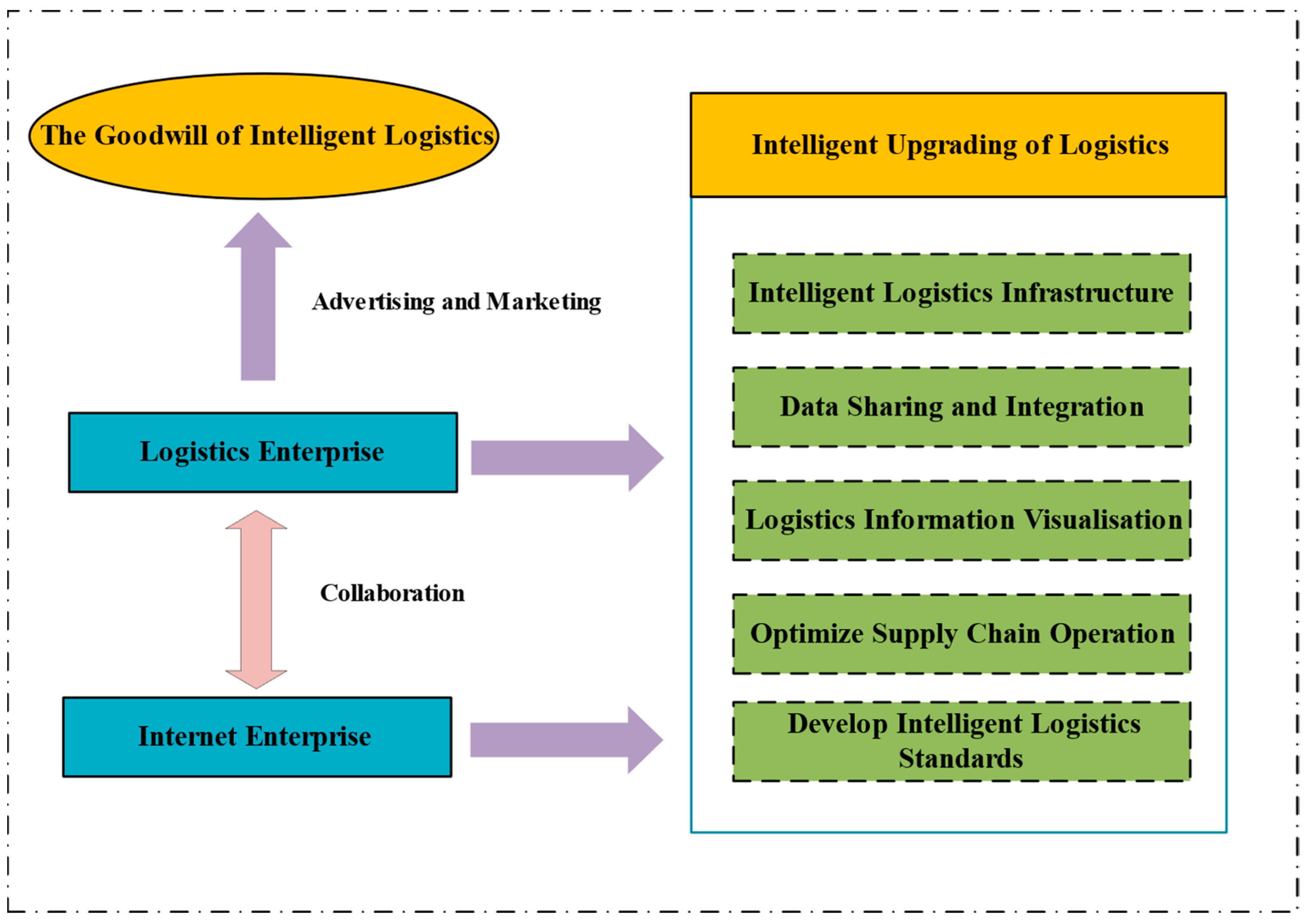

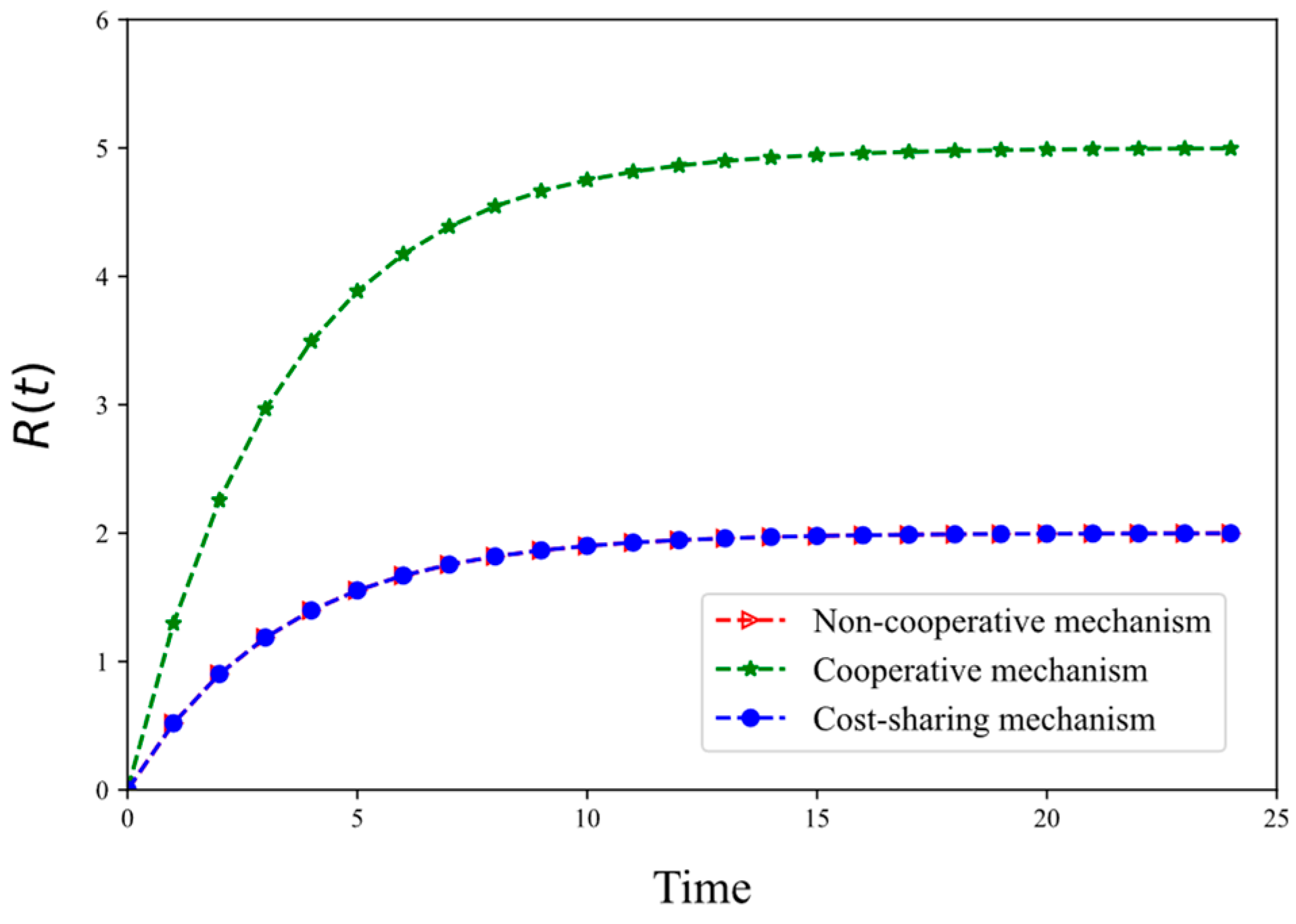
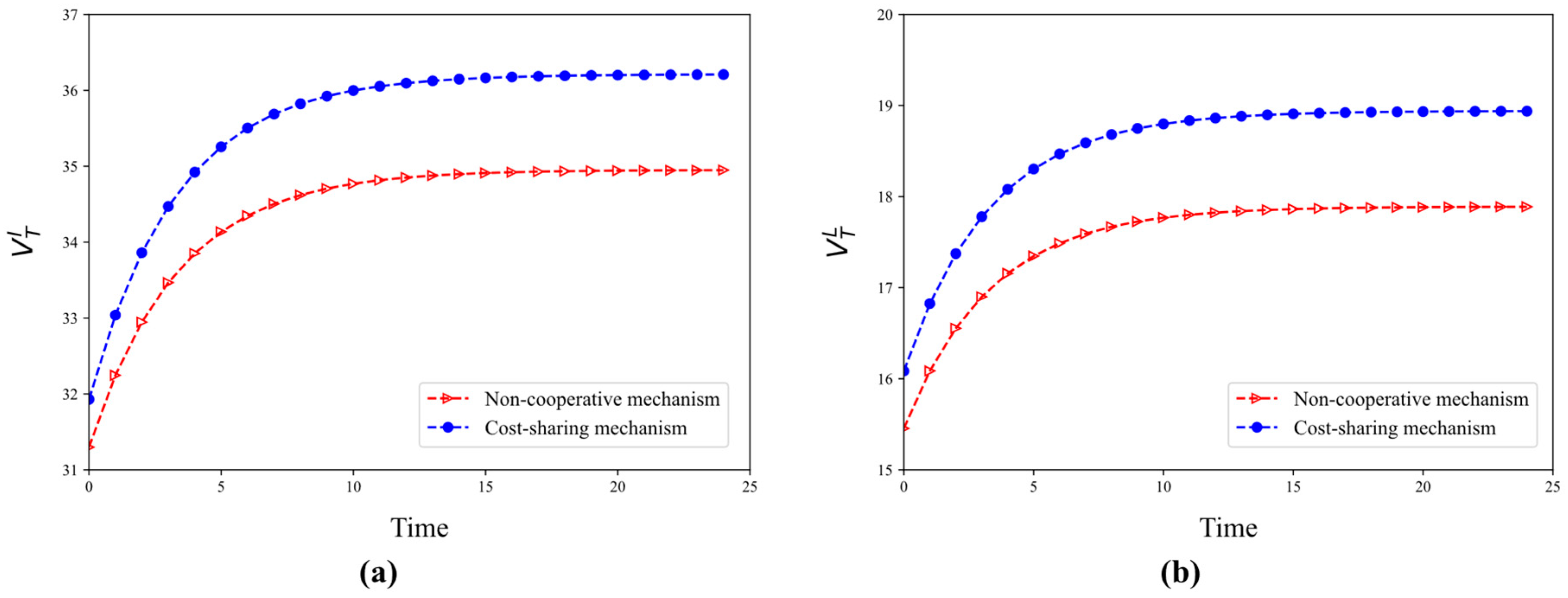


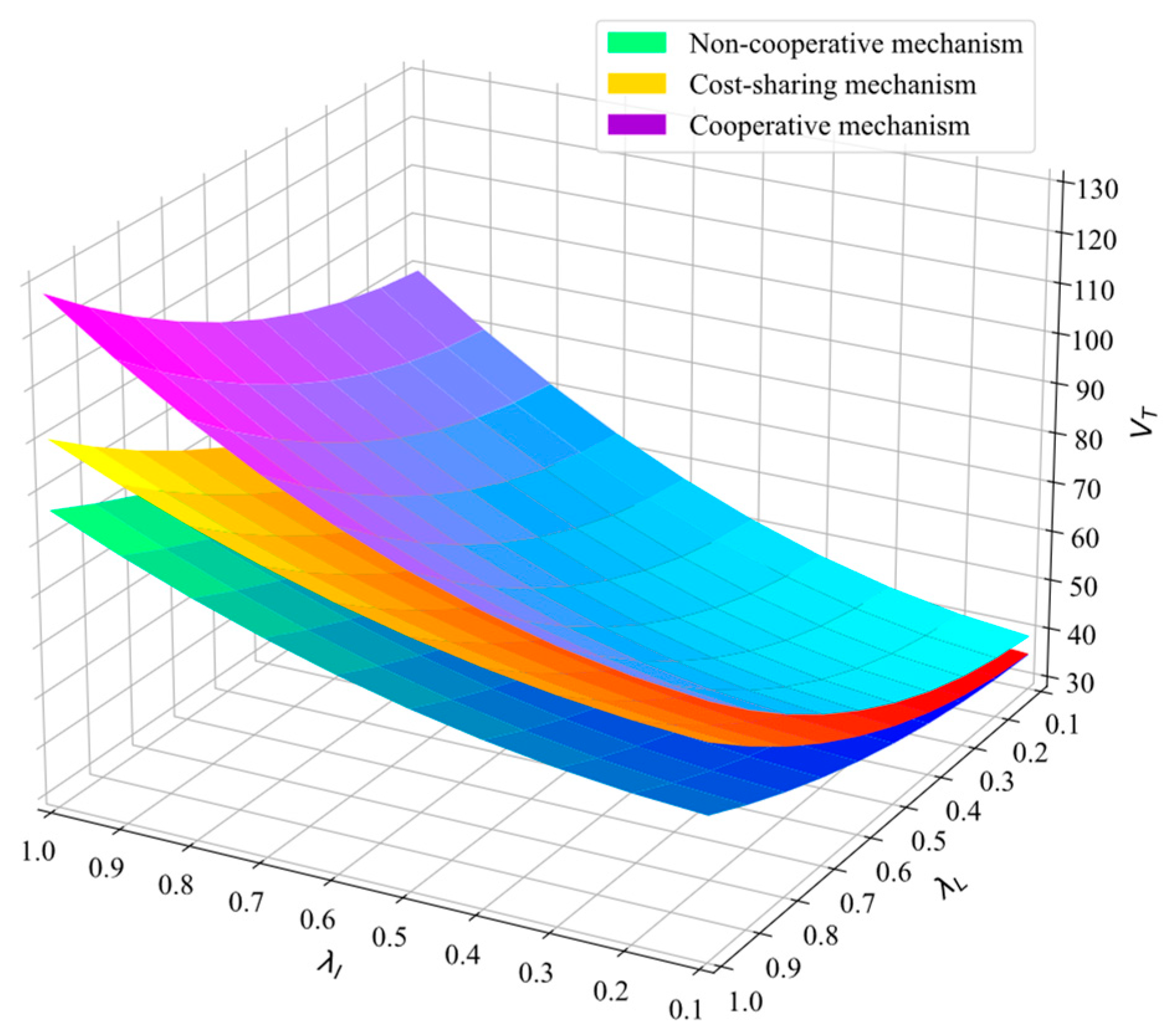
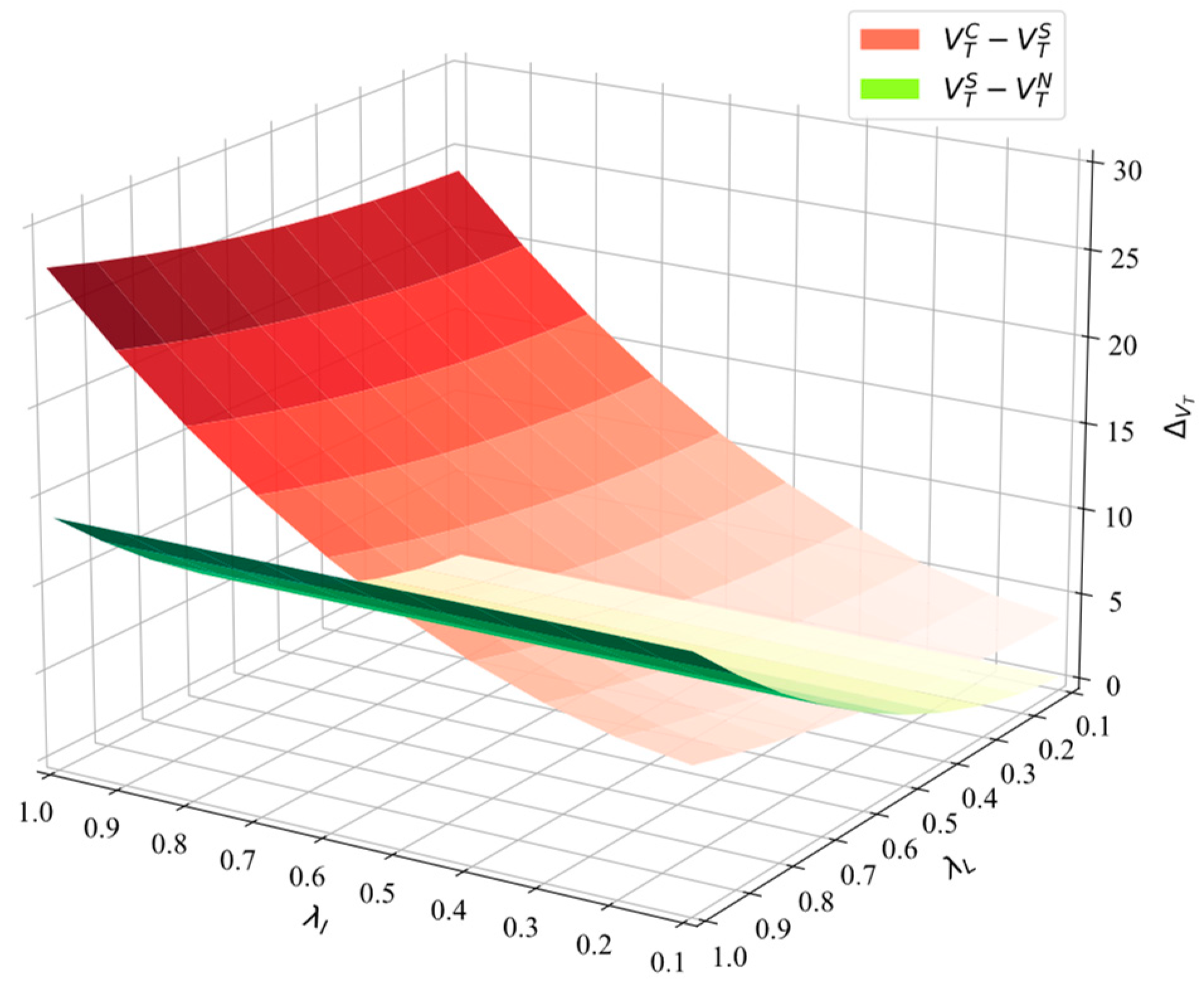
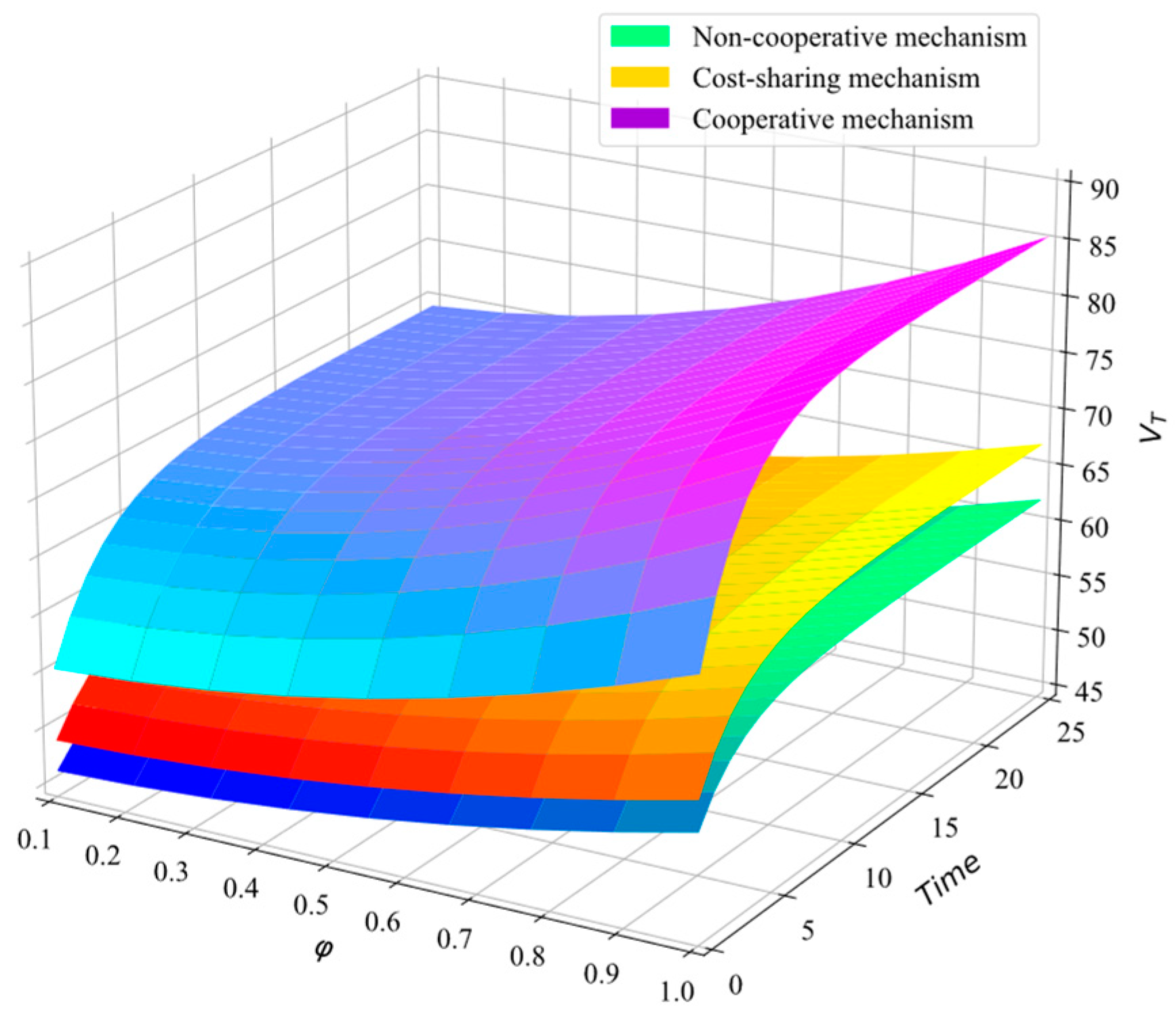

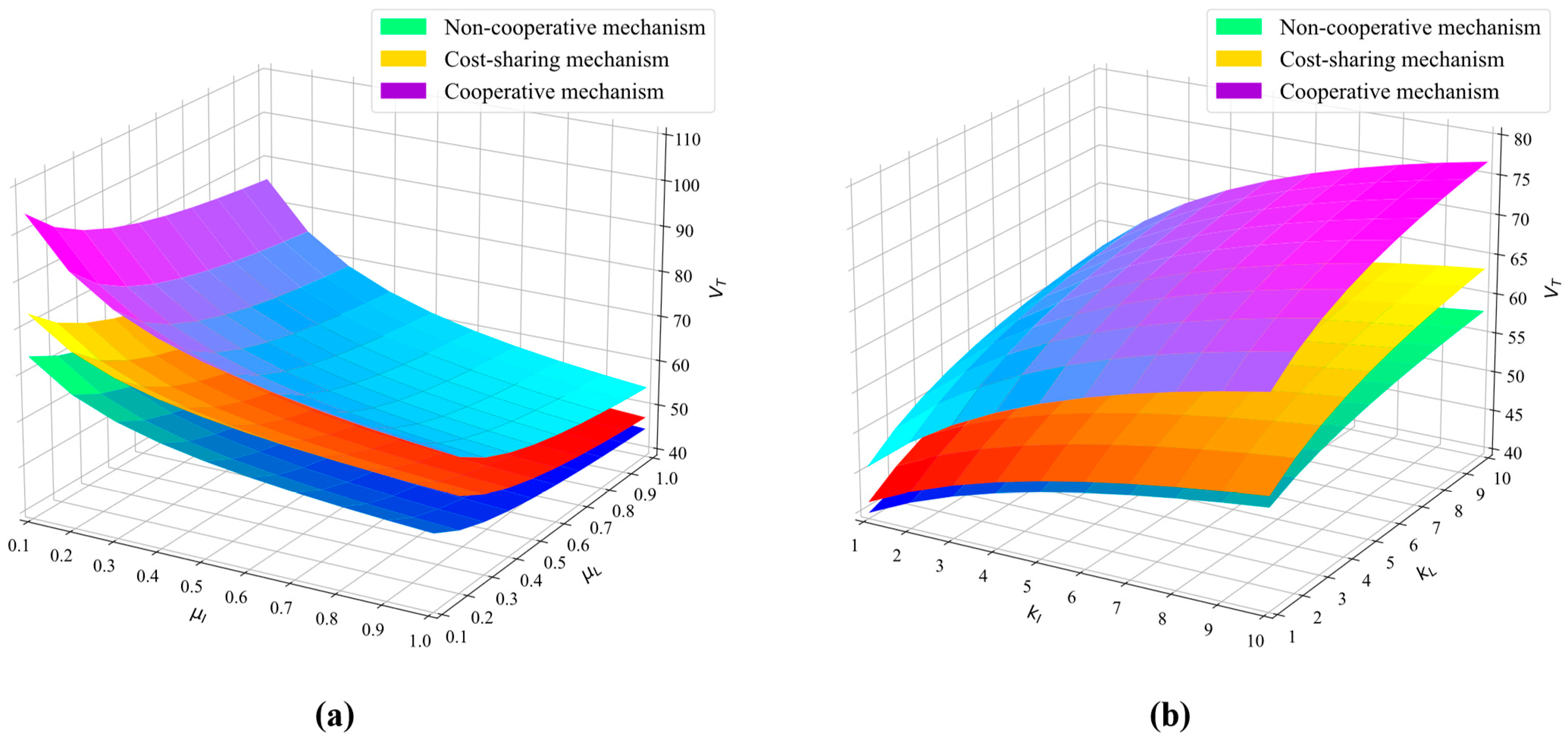

Disclaimer/Publisher’s Note: The statements, opinions and data contained in all publications are solely those of the individual author(s) and contributor(s) and not of MDPI and/or the editor(s). MDPI and/or the editor(s) disclaim responsibility for any injury to people or property resulting from any ideas, methods, instructions or products referred to in the content. |
© 2024 by the authors. Licensee MDPI, Basel, Switzerland. This article is an open access article distributed under the terms and conditions of the Creative Commons Attribution (CC BY) license (https://creativecommons.org/licenses/by/4.0/).
Share and Cite
Jiang, W.; Li, N. The Intelligent Upgrading of Logistics between an Internet Enterprise and a Logistics Enterprise Based on Differential Game Theory. Sustainability 2024, 16, 8556. https://doi.org/10.3390/su16198556
Jiang W, Li N. The Intelligent Upgrading of Logistics between an Internet Enterprise and a Logistics Enterprise Based on Differential Game Theory. Sustainability. 2024; 16(19):8556. https://doi.org/10.3390/su16198556
Chicago/Turabian StyleJiang, Weidong, and Naiwen Li. 2024. "The Intelligent Upgrading of Logistics between an Internet Enterprise and a Logistics Enterprise Based on Differential Game Theory" Sustainability 16, no. 19: 8556. https://doi.org/10.3390/su16198556
APA StyleJiang, W., & Li, N. (2024). The Intelligent Upgrading of Logistics between an Internet Enterprise and a Logistics Enterprise Based on Differential Game Theory. Sustainability, 16(19), 8556. https://doi.org/10.3390/su16198556




